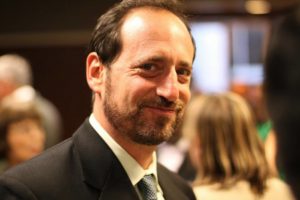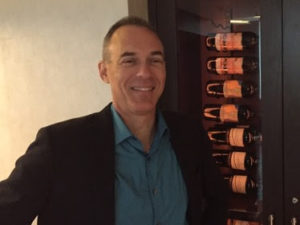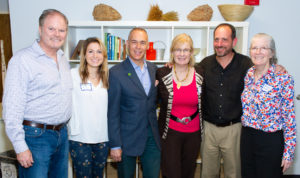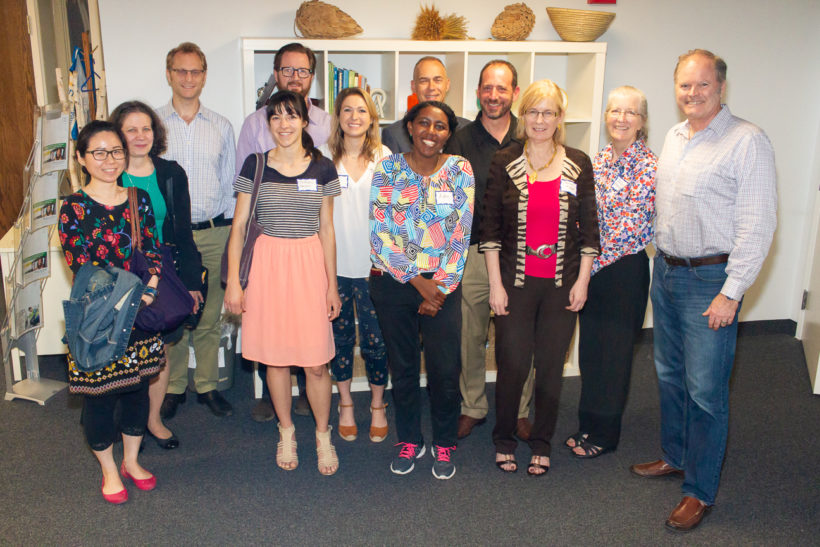 By MIRIAM ACZEL
By MIRIAM ACZEL
On Thursday, June 14th, Leaders in Energy held the fourth Green Career Momentum (GCM) event at Green America. The GCM series has been held to assist Leaders in Energy members in find or create a dream green job. Each session has a specialized topic, speakers, skill, and green economy focus area. (See syllabus here: http://files.constantcontact.com/4bc55c81401/bb88fc55-5482-4cd8-98b3-b011c7457fc6.pdf).
Janine Finnell, Leaders in Energy Executive Director, kicked off the session, the second to last out of the 5-session package, by introducing the theme and speakers. Moderated by Dr. Beth Offenbacker, Founder and Principal at Waterford, Inc., the fourth session focused on how to build credibilityas a green leader, and featured talks by Green Business Roundtable’s Steve Offutt and Dave Feldman at Green America on their experiences working at ‘green’ organizations.
Beth then opened the session on how to establish integrity as a green leader with a round of ‘the Credibility Game.’ Beth displayed photos of well-known personalities—from former Presidents Barak Obama and Richard Nixon to Mother Theresa and Jacques Cousteau—and encouraged participants to share their reactions: is this person credible?After discussing the traits that led to describing people as more or less credible, Beth displayed a picture of BP’s logo, and moved the discussion to how we establish credibility in individuals and organizations.
The words participants identified as related to credibility—successful, pioneer, educated, thoughtful, morals, core values, consistency—contrasted to notions that led to lack of trust, such as taking shortcuts, a lack of integrity, and inconsistent outcomes.
Participants also commented that credibility could be relative—for example, one participant explained that Nixon was not credible, as his nickname, ‘Tricky Dick’ hints, but that on the other hand, he also had numerous positive accomplishments under his tenure including the creation of the Environmental Protection Agency.
Beth underscored the notion of credibility as a gatewayto landing a green job, because, “as green leaders we’re bringing our reputations with us. So, how we reinforce our personal brandand not undermine it with things that may undermine our credibility?” She also referenced the first Green Career Momentum with Cheryl Bedard, who focused on the idea of being “problem solvers,” and asked participants to think about “how do we continueto do what we are best at,” and maintain credibility?
Beth continued that as green leaders, the feeling of respect and trust that inspire others are crucial, and we should be focusing on how to demonstrate that you are truly trustworthy, responsible, reliable. Demonstrating this is particularly important because others will “trust your judgement”, and these qualities attract committed and enthusiastic supporters, who wantto work for or with you.
This is essential for success, and Beth next discussed the 4 Key Factors for Credibility:
- Expertise
- Trustworthiness
- Similarity
- Physical attractiveness
She discussed that expertise and trustworthiness are the most important elements, but that physical attractiveness and similarity do play a role (Dean Rieck, 2018; Robert Cialdini, 2006).
She explained that being known for something that can support success – a level of expertise that you can easily share with others, is important to develop, and Green Leaders must strive to “live by our word, demonstrate our word.”
Participants discussed further and commented that trust is “hard to build and very easy to lose”. Similarity, in terms of values, is also important because “people do business with people they know and like”, a shortcut to establishing trust.
Sharing and Learning from Participants’ Expertise
The session next turned to a breakout exercise, where participants worked with a partner do discuss “what is your area of expertise and how do you demonstrate it?”
Attendees were then encouraged to share with the others what they learned about their partner’s expertise, and their challenges and opportunities in demonstrating it.
Participants’ discussions included their experience with urban design and their interest in applying that knowledge to regeneration and expertise in revamping natural resources. Another focused on their prowess at working to set up processes, such as building greenhouses in NYC and financial operations, and her skills in developing processes where there was nothing before. Another shared that they were a barista, focusing on learning about the sustainability of the coffee supply chain.
Beth explained that Green Leaders should focus on their expertise, and how you can demonstrate this. One participant added that while “you can go fast by yourself but you go farther with other people.”
Beth next turned to introduce the two speakers, who would discuss the challenges and opportunities in becoming a green leader, and the importance of how we make the most of what’s available in green organizations.

Dave Feldman
Dave Feldman described his experience, explaining that he sees “2 ways of defining of green jobs”, first, as a product and service that seeks to meet sustainable goals; or, alternatively, a green job position in a company that’s not environmental, but focusing on improving sustainability internally.
Dave said he sees expertise as ” a connector,” and discussed his career trajectory beginning with his work at doing economic deve the British Embassy. In his job, he look at at cities and regions as complex systems in themselves.” He then co-founded Livability Project was founding Director of Green Bethesda Green, organizations that support local, sustainable communities.
Dave provided examples of the importance in “having a credible background”, and companies like Honest Tea MOM’s Organic Market have brands that “shine, showcase and tell their story.”
Dave then turned his attention to Green America, explaining that it was founded in 1982 with a mission of advocacy work and campaigns, focusing on climate change, agriculture, energy, and labor. Green America later built new programs to serve growing green business. More recently, Dave became Director of Green America’s Center for Sustainability Solutions, which transforms supply chains because “change doesn’t occur unless the whole system changes.”
Dave also discussed the role of stakeholder engagement, mentioning the GMO working group, and explaining that “farmers, seed growers, academics, retailers” all need a seat at the table in order to transform industry into being more sustainable. Another example was Green America had a Bad Apple campaign against Apple several years ago and is now working with them through the Center to eliminate toxic elements from the manufacturing processes.
Dave concluded that there are many different types of green jobs, some that doesn’t initially appear green. For example, some companies reduce waste or repair old products which keeps them out of landfills.
Dave explained that jobseekers should build on their unique competencies to create opportunities. For example, he designed Bethesda Green as a community and business “hub” because none existed,” which forced him to think creatively. The experience compelled him to examine what his expertise is, and “how do you show a company that what you have is what they need?”
Dave concluded by saying that “in green space lots of companies don’t know what they don’t know’ – so you might have an opportunity to show them a new way. Nothing beats persistence.”
Dave provided three pieces of advice: “preparation – get out there and do your research; volunteer – come to events to network and get involved; and always to play to your strengths – if you know how to write, record video, share technical skills, look at what your strengths are and play to them. And if you can’t find something, you can create it!”

Steve Offutt
The speaker session next turned to Steve Offutt, who discussed specific things that have established credibility. Steve explained that “if you have a job, you should be on the green team even if you’re trying to leave. Wherever you are, get involved in green.”
Steve spoke about his MBA degree, with a focus on supply chain and “the business side of how to incorporate advances that have profitability.” When Steve came to EPA and ENERGY STAR program, “ENERGY STAR was a startup, new way of doing things,” so they built programs including the ‘smartway’, looking at the best work for commuters. He continued that today, “much of the experience in startups, such as NewRide,is on variety of things such as carbon markets.”
Another important example Steve discussed was his role as a founder of the Green Business Roundtable,which has a mailing list of over 1200 people. Steve explained that nearly all clients had somehow connected back to one another from the initial roundtable, thereby establishing consistency. By “doing a bit of homework,” Steve added, that you can easily “establish credibility, complement, etc.” by doing the necessary homework and being knowledgeable.
After Steve finished his presentation, John Gaffigan encouraged attendees “get out there, use social media.” He explained that on social media such as “LinkedIn or twitter, you can build your personal brand, and it’s important to createoriginalcontent”.
Dave briefly added on the note of credibility and consistency as a theme that his own pointers for ways to demonstrate expertise? “When you meet people, follow up. You must “bring value – send them an article, and that way if you bring value to them they will remember.”
Beth added for context, “don’t be solicitous but the only way you can stay relevant is when you personalize it, allow ability to reach back and take the extra time to show you that you’re working.”
Concluding Tips and Advice
Finally, on illuminating the opportunities and possibilities, Dave added that key is “consistency, so when at a new job, get to know the organization’s HR person, and be persistent and leave no stone unturned. Play to your assets and strengths.”
From this session, we saw how Dave created his own job, where it was an early stage, has evolved very much. Bethesda Green was his idea – which showed that sometimes when you have an idea and don’t know where to go, there are tools to grow business.
Beth concluded with a few tips as well, mentioning Caildini’s 6 principles of persuasion, as 6 short cuts that are universal in guiding or persuading human behavior: Reciprocity; Scarcity; Authority; Consistency; Liking; Consensus.
After an interesting and interactive session, participants left with new perspectives and approaches to developing credibility in green leadership. We look forward to the 5th annual Green Jobs Forum in August.




Leave a Reply